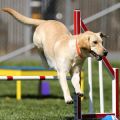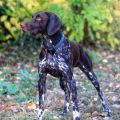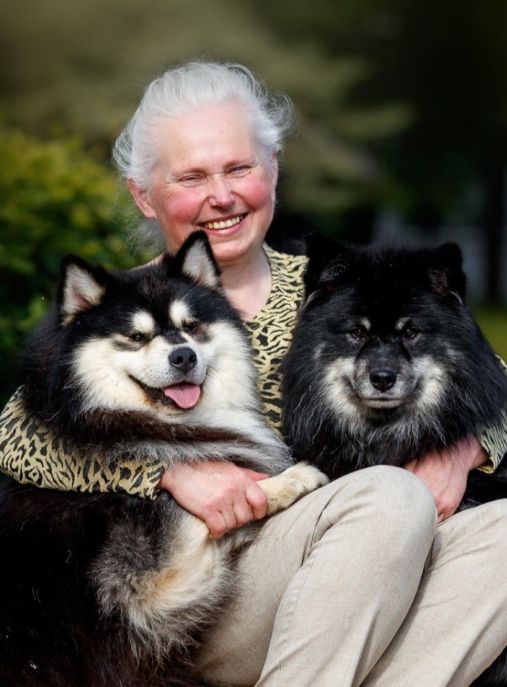The Lapponian Herder is a medium-sized working dog breed that originated in Lapland, a region in northern Finland. Also known as the Lapinporokoira, this breed is highly valued for its herding abilities and is primarily used to manage reindeer herds in its native land. With its strong and agile build, the Lapponian Herder is well-suited for the demanding tasks of herding and working in harsh Arctic conditions.
The history of the Lapponian Herder can be traced back several centuries. It is believed that the breed's ancestors were brought to Lapland by the Sami people, who are indigenous to the region. These dogs were selectively bred over generations to develop the traits necessary for herding reindeer, such as intelligence, endurance, and a strong work ethic. The Lapponian Herder's lineage can be traced back to the ancient Scandinavian herding spitz-type dogs.
According to the FCI (Fédération Cynologique Internationale) typology, the Lapponian Herder belongs to Group 5: Spitz and Primitive Types, Section 3: Nordic Watchdogs and Herders. This classification reflects the breed's origins as a herding dog in the Nordic region. The FCI standard for the Lapponian Herder describes its physical characteristics, temperament, and working abilities.
The Lapponian Herder is a versatile working dog that excels in herding and guarding tasks. Its primary role is to assist the Sami people in managing reindeer herds, but it can also be trained for other purposes such as search and rescue, obedience, and agility. This breed is known for its intelligence, loyalty, and strong protective instincts, making it an excellent companion and working partner.
In terms of physical appearance, the Lapponian Herder is a medium-sized dog with a well-muscled body and a sturdy build. Males typically stand between 19.5 to 21.5 inches (50-55 cm) at the shoulder, while females are slightly smaller, ranging from 18 to 20 inches (45-50 cm). The breed's weight ranges from 48 to 61 pounds (22-28 kg). The Lapponian Herder has a dense double coat, which consists of a soft undercoat and a longer, harsher outer coat. The coat comes in various shades of black, brown, and tan, with white markings on the chest, paws, and tail tip.
The average life expectancy of the Lapponian Herder is around 12 to 14 years, which is relatively long for a medium-sized breed. This breed is generally healthy and robust, but like all dogs, it may be prone to certain health conditions. Some of the potential health issues that can affect the Lapponian Herder include hip dysplasia, progressive retinal atrophy (PRA), and epilepsy. Responsible breeders conduct health screenings and genetic testing to minimize the risk of these conditions.
One interesting fact about the Lapponian Herder is its exceptional herding skills. These dogs have a natural instinct for herding and are known for their ability to work independently, making decisions based on their own judgment. They are highly adaptable and can handle the challenges of herding reindeer in the rugged and remote landscapes of Lapland. The Lapponian Herder's strong work ethic, intelligence, and agility make it a valuable asset to the Sami people and other herding communities.
In conclusion, the Lapponian Herder is a remarkable working dog breed with a rich history and strong ties to its native land. Its herding abilities, intelligence, and loyalty make it an ideal companion for those involved in herding and other working activities. With its striking appearance and versatile skill set, the Lapponian Herder continues to thrive in its traditional role while also gaining recognition and appreciation worldwide.
The Lapponian Herder, also known as the Lapland Reindeer Dog, is a remarkable breed with a unique character. These dogs are known for their intelligence, loyalty, and strong work ethic. Originally bred for herding reindeer in the harsh climates of Lapland, these dogs have adapted to the extreme conditions and developed a set of traits that make them exceptional working and companion animals.
In terms of behavior, Lapponian Herders are known for their calm and gentle nature. They are not aggressive or dominant, but rather have a friendly and approachable demeanor. They are highly sociable and enjoy being around people and other animals. This makes them excellent family pets and they get along well with children and other pets when properly socialized.
Due to their herding background, Lapponian Herders have a strong instinct to work and please their owners. They are highly trainable and eager to learn new commands and tasks. However, they can also be independent thinkers, which means that training should be consistent, firm, and positive. Harsh training methods or punishment can be counterproductive and may lead to a stubborn or fearful dog.
When it comes to raising a Lapponian Herder, early socialization is crucial. Expose them to various environments, people, and animals from a young age to ensure they grow up to be well-rounded and confident dogs. They thrive in an active household where they have plenty of mental and physical stimulation. Daily exercise, such as long walks, runs, or play sessions, is essential to keep them happy and prevent boredom.
Lapponian Herders are known for their strong herding instincts, which means they may try to herd children, other pets, or even cars. It is important to redirect this behavior and provide them with appropriate outlets for their energy. Engaging them in activities like obedience training, agility, or herding trials can help fulfill their natural instincts and keep them mentally stimulated.
These dogs are highly adaptable and can live in various environments, including apartments, as long as they receive enough exercise and mental stimulation. However, they are happiest in homes with access to a securely fenced yard where they can roam and explore. Lapponian Herders are not recommended for first-time dog owners, as they require an experienced handler who can provide them with the guidance and structure they need.
In conclusion, Lapponian Herders are intelligent, loyal, and hardworking dogs with a friendly and gentle nature. They make excellent family pets and are highly trainable. However, they require early socialization, consistent training, and plenty of mental and physical exercise to thrive. With the right care and attention, a Lapponian Herder can become a cherished companion and a valuable working partner.
The Lapponian Herder is a beautiful and intelligent breed that requires specific care to ensure their well-being and happiness. Here are some tips on how to properly care for Lapponian Herder dogs, including what to do and what not to do:
1. Exercise: Lapponian Herders are active dogs that require regular exercise to maintain their physical and mental health. Daily walks, runs, or play sessions in a secure area are essential. Engaging them in activities like agility training or obedience classes can also help keep them mentally stimulated.
2. Grooming: This breed has a thick double coat that requires regular grooming to prevent matting and keep their coat healthy. Brush their fur at least once a week, paying extra attention to their undercoat during shedding seasons. Regular brushing will also help distribute natural oils and keep their skin healthy. Bathing should be done only when necessary, using a mild dog shampoo.
3. Socialization: Lapponian Herders are known for their friendly and sociable nature. Early socialization is crucial to ensure they grow up to be well-rounded dogs. Expose them to various people, animals, and environments from a young age to help them become confident and adaptable.
4. Training: These dogs are highly intelligent and eager to please, making them relatively easy to train. Use positive reinforcement techniques such as treats, praise, and play to motivate them. Consistency, patience, and firmness are key when training a Lapponian Herder. Early obedience training is essential to prevent any potential behavioral issues.
5. Mental Stimulation: Lapponian Herders are intelligent working dogs that thrive on mental stimulation. Provide them with interactive toys, puzzle games, and tasks that challenge their problem-solving abilities. Engaging their minds will help prevent boredom and destructive behaviors.
6. Health Care: Regular veterinary check-ups are crucial to ensure your Lapponian Herder's overall health. Vaccinations, parasite prevention, and dental care should be maintained as per your vet's recommendations. Additionally, keep an eye out for any signs of health issues such as hip dysplasia, eye problems, or allergies, and seek immediate veterinary attention if needed.
7. Nutrition: Provide your Lapponian Herder with a balanced and nutritious diet that suits their age, size, and activity level. High-quality dog food, preferably formulated for active breeds, will provide them with the necessary nutrients. Avoid overfeeding and monitor their weight to prevent obesity, which can lead to various health problems.
What NOT to do:
1. Neglect exercise: Lack of exercise can lead to behavioral issues and obesity in Lapponian Herders. Avoid confining them to a small space for extended periods and ensure they get enough physical activity.
2. Use harsh training methods: Lapponian Herders respond best to positive reinforcement training techniques. Avoid using harsh punishments or physical force, as it can damage their trust and hinder their learning process.
3. Leave them alone for long periods: Lapponian Herders are social dogs that thrive on human companionship. Leaving them alone for extended periods can lead to separation anxiety and destructive behaviors. If you have to be away, provide them with mental stimulation and consider hiring a dog sitter or using doggy daycare.
4. Neglect grooming: Neglecting their grooming needs can result in matting, skin issues, and discomfort for your Lapponian Herder. Regular brushing and proper coat care are essential to keep them healthy and comfortable.
5. Ignore their mental stimulation: Lapponian Herders are intelligent dogs that need mental stimulation to prevent boredom and behavioral problems. Neglecting their mental needs can lead to restlessness and destructive behaviors.
By following these tips and providing proper care, you can ensure that your Lapponian Herder lives a happy, healthy, and fulfilling life.
The Lapponian Herder dog breed is known for its striking and unique coat color. These dogs typically have a common color that is a combination of various shades of black, gray, and white. The coloration of Lapponian Herders is often described as a beautiful and harmonious blend of these hues, creating a visually appealing and distinctive appearance.
The primary color of the Lapponian Herder's coat is black, which forms the base of their coloration. The black color is usually deep and rich, giving the dog a sense of elegance and strength. It covers most of the body, including the back, sides, and tail. The black coloration is often seen in a solid and uniform pattern, creating a sleek and polished appearance.
Intermingled with the black, Lapponian Herders also exhibit shades of gray throughout their coat. The gray coloration can vary in intensity, ranging from light silver to darker charcoal tones. These gray shades are typically seen in patches or streaks, adding depth and dimension to the dog's overall coloration. The gray areas often appear on the chest, legs, and sometimes on the face, creating a captivating contrast against the black backdrop.
In addition to black and gray, Lapponian Herders may also display patches of white on their coat. These white areas are usually found on the chest, paws, and sometimes on the tip of the tail. The white coloration provides a striking contrast against the darker shades, further enhancing the dog's overall appearance. It adds a touch of brightness and creates a captivating visual effect.
The combination of black, gray, and white in the Lapponian Herder's coat creates a captivating and eye-catching coloration that is unique to this breed. The harmonious blend of these hues gives the dog a sense of elegance, while the contrasting patches of white add a touch of brightness and charm. The overall effect is a visually stunning coat that is both beautiful and functional, allowing the Lapponian Herder to blend seamlessly into its natural surroundings.
It is important to note that while the common color of Lapponian Herders is described as black, gray, and white, individual dogs may exhibit slight variations in their coloration. Some dogs may have more prominent gray patches, while others may have a higher concentration of black or white. These variations add to the charm and individuality of each Lapponian Herder, making them truly unique and captivating companions.
The Lapponian Herder, also known as the Lapland Reindeer Dog, is a hardy and robust breed originating from the northern regions of Finland, Sweden, and Norway. These dogs were primarily bred for herding reindeer and have evolved to withstand the harsh Arctic climate. With proper care and attention, Lapponian Herders can lead healthy and active lives.
One of the most common health concerns in Lapponian Herders is hip dysplasia. This genetic condition affects the hip joints, causing pain, lameness, and difficulty in movement. Regular screening and testing for hip dysplasia are crucial to identify affected dogs and prevent the condition from worsening. Responsible breeders should ensure that both parents have good hip scores before breeding.
Another prevalent health issue in this breed is progressive retinal atrophy (PRA). PRA is a degenerative eye disease that gradually leads to vision loss and, in severe cases, blindness. Regular eye examinations by a veterinary ophthalmologist are essential to detect PRA early on. Responsible breeders should also conduct genetic testing to avoid breeding dogs carrying the PRA gene.
Lapponian Herders are generally a healthy breed, but they can be prone to certain allergies. Environmental allergens, such as pollen or dust mites, can cause skin irritations, itching, and discomfort. Food allergies can also manifest as skin problems, digestive issues, or ear infections. Identifying and eliminating the allergen from the dog's environment or diet is crucial in managing these allergies. Consultation with a veterinarian is recommended to determine the specific allergen and develop an appropriate treatment plan.
To maintain the overall health of Lapponian Herders, regular exercise is vital. These dogs have a high energy level and require daily physical activity to prevent obesity and keep their muscles toned. Long walks, jogging, or engaging in dog sports like agility or obedience training are excellent ways to keep them mentally and physically stimulated.
Proper nutrition is also essential for the well-being of Lapponian Herders. A balanced diet that meets their nutritional needs, including high-quality protein, healthy fats, and a variety of fruits and vegetables, is crucial. Avoid overfeeding and monitor their weight to prevent obesity, which can lead to various health issues.
Regular veterinary check-ups are crucial for early detection of any health problems. Vaccinations, parasite prevention, and dental care should be part of the routine veterinary care for Lapponian Herders. Additionally, maintaining good dental hygiene by brushing their teeth regularly can help prevent dental diseases and keep their breath fresh.
Grooming is relatively low maintenance for Lapponian Herders. They have a thick double coat that requires regular brushing to remove loose hair and prevent matting. During shedding seasons, more frequent brushing may be necessary to manage the increased hair loss. Bathing should be done as needed, using a mild dog shampoo to avoid drying out their skin.
In conclusion, Lapponian Herders are generally a healthy breed, but they can be prone to hip dysplasia, progressive retinal atrophy, and allergies. Responsible breeding practices, regular veterinary care, proper nutrition, exercise, and grooming are essential for maintaining the health and well-being of these beautiful and hardworking dogs.
The Lapponian Herder is a beautiful and hardworking breed of dog that originates from Lapland, a region in northern Scandinavia. These dogs were traditionally used for herding reindeer and have a strong and robust build. To ensure the health and well-being of Lapponian Herder dogs, it is crucial to provide them with a balanced and nutritious diet.
When it comes to feeding Lapponian Herder dogs, it is important to consider their activity level, age, and overall health. These dogs are known for their high energy levels and require a diet that provides them with the necessary fuel to sustain their active lifestyle. A diet rich in high-quality proteins, healthy fats, and complex carbohydrates is ideal for this breed.
Protein is an essential component of a Lapponian Herder's diet as it helps in muscle development and repair. Good sources of protein for these dogs include lean meats like chicken, turkey, and fish. It is important to ensure that the meat is cooked thoroughly and free from any bones or seasoning that may be harmful to the dog. Additionally, including some organ meats like liver or heart in their diet can provide essential nutrients.
Healthy fats are also crucial for the overall health of Lapponian Herder dogs. Fats provide them with energy and help in maintaining healthy skin and coat. Including sources of healthy fats like fish oil, flaxseed oil, or coconut oil in their diet can be beneficial. However, it is important to remember that fats should be given in moderation to avoid weight gain or other health issues.
Complex carbohydrates are an excellent source of sustained energy for Lapponian Herder dogs. Including whole grains like brown rice, quinoa, or oats in their diet can provide them with the necessary carbohydrates. It is important to avoid feeding them processed grains or foods high in simple sugars, as these can lead to weight gain and other health problems.
In addition to the main components of their diet, Lapponian Herder dogs also require a variety of fruits and vegetables. These provide essential vitamins, minerals, and antioxidants that support their overall health and immune system. Some safe options include carrots, green beans, sweet potatoes, and blueberries. However, it is important to avoid feeding them toxic foods like grapes, onions, or garlic, as these can be harmful to dogs.
Feeding Lapponian Herder dogs should be done in appropriate portions to maintain a healthy weight. It is recommended to divide their daily food intake into two or three meals to avoid overeating or digestive issues. Monitoring their weight and adjusting the portion sizes accordingly is essential to prevent obesity or malnutrition.
Lastly, it is crucial to provide Lapponian Herder dogs with access to fresh and clean water at all times. Hydration is vital for their overall health and helps in maintaining proper bodily functions.
In conclusion, a well-balanced and nutritious diet is essential for the health and well-being of Lapponian Herder dogs. Providing them with high-quality proteins, healthy fats, complex carbohydrates, and a variety of fruits and vegetables will ensure they receive the necessary nutrients. Avoiding toxic foods, monitoring portion sizes, and providing access to fresh water are also important factors to consider. By following these guidelines, you can help your Lapponian Herder dog thrive and lead a healthy and active life.






